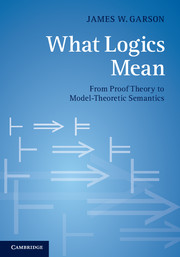Book contents
- Frontmatter
- Dedication
- Contents
- Preface
- Acknowledgements
- 1 Introduction to model-theoretic inferentialism
- 2 Deductive expression
- 3 Local expression
- 4 Global expression
- 5 Intuitionistic semantics
- 6 Conditionals
- 7 Disjunction
- 8 Negation
- 9 Supervaluations and natural semantics
- 10 Natural semantics for an open future
- 11 The expressive power of sequent calculi
- 12 Soundness and completeness for natural semantics
- 13 Connections with proof-theoretic semantics
- 14 Quantifiers
- 15 The natural semantics of vagueness (with Joshua D. K. Brown)
- 16 Modal logic
- Summary
- References
- Index
3 - Local expression
Published online by Cambridge University Press: 05 June 2014
- Frontmatter
- Dedication
- Contents
- Preface
- Acknowledgements
- 1 Introduction to model-theoretic inferentialism
- 2 Deductive expression
- 3 Local expression
- 4 Global expression
- 5 Intuitionistic semantics
- 6 Conditionals
- 7 Disjunction
- 8 Negation
- 9 Supervaluations and natural semantics
- 10 Natural semantics for an open future
- 11 The expressive power of sequent calculi
- 12 Soundness and completeness for natural semantics
- 13 Connections with proof-theoretic semantics
- 14 Quantifiers
- 15 The natural semantics of vagueness (with Joshua D. K. Brown)
- 16 Modal logic
- Summary
- References
- Index
Summary
The last chapter shows that the rules of propositional logic underdetermine a meaning for the connectives, at least when deductive expression is the benchmark to be used for determining what the system says about how to interpret them. One diagnosis of the problem is that deductive expression is entirely insensitive to how the rules of a logic are formulated. All that matters to whether a set of valuations is a deductivemodel of a system is what arguments are distinguished as provable by its rules. However, rule format can have an effect on expressive power when the criterion for what a system expresses takes details concerning rule formulation into account. The most direct way of doing this is to define expression via the notion of a local model of a rule. A set of valuations V is a local model of a rule when every member of V that satisfies the input(s) of the rule also satisfies its output. The relevant definitions leading to the notion of local expression are listed here. Since we will discuss (multiple conclusion) sequent systems in this chapter, we will speak more generally of satisfaction of sequents rather than satisfaction of arguments.
- Type
- Chapter
- Information
- What Logics MeanFrom Proof Theory to Model-Theoretic Semantics, pp. 34 - 45Publisher: Cambridge University PressPrint publication year: 2013



